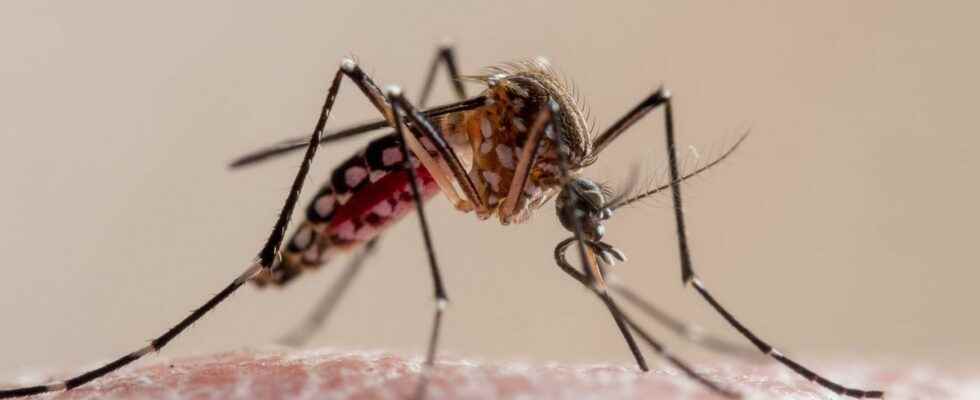Published on
Updated
Reading 2 mins.
In its February epidemiological update, Public Health France confirms the return of dengue on the territory. A total of five cases have been identified since the beginning of the year.
Bad news for the French: dengue fever, this potentially fatal tropical disease transmitted by mosquitoes of the Aedes genus, is making a comeback in Guyana.
A new strain on the territory
According to the Public Health Agency, five cases of dengue fever have been identified since the beginning of the year in the municipalities of Saint-Laurent du Maroni and Kourou.
If three strains could not be analyzed, two cases “are of the DEN-3 serotype“details the epidemiological bulletin. Which means that the strain is new on the territory: DENV-3 had not circulated for 15 years in this overseas region.
Guyanese therefore have little chance of being immune to this strain. In addition, acquired immunity against one of the strains does not protect against the others.
? Dengue fever is back in #Guyana
?Kourou/Remire/Saint Laurent
This is serotype 3, which we have not seen for 15 years on the territory, which means that there is no immunity in the population.
ℹ️The mosquito that transmits dengue bites during the day ⛅️ pic.twitter.com/BzNQLcCyFX
— ARS GUYANA (@ars_guyane) February 9, 2023
Guyana is not in an epidemic phase
If this news is not reassuring, the epidemiological situation is not alarming: it is only sporadic cases.
“The epidemiological situation still corresponds to phase 1 of the Dengue Epidemic Surveillance, Alert and Management Plan“, confirms Public Health France.
In other words: Guyana is not in an epidemic phase and does not present any risk outbreak.
No individual has otherwise been hospitalized with dengue.”and no deaths have been recorded since the beginning of the year“.
As for the number of weekly cases, it has varied between 19 and 44 in recent weeks.
Prevent the spread of disease
In its bulletin, the ARS of Guyana specifies the preventive measures against these viruses. Dengue fever, chikungunya and Zika are arboviruses transmitted by the Aedes aegypti mosquito which represents a constant threat in Guyana. This domestic mosquito reproduces mainly in small collections of clear water, inside or around dwellings.
- Biological diagnosis: it’s important to prescribe a biological diagnosis in ANY clinically suggestive case of arbovirosisindicating the date of onset of the signs on the prescription and favoring PCR (D1 to D7 for dengue fever, or serology from D5).
- Individual prevention: it is essentially based on means of protection against mosquito bites (repellent sprays or creams, coils, electric diffusers, long clothing, mosquito nets).
- Collective prevention: it is based on vector control and social mobilization. Thus, to prevent the spread of arboviruses, it is imperative that everyone:
- Fight against breeding sites (containers, saucers, tires, etc.),
- Protects against the mosquito to avoid bites,
- Consult your doctor quickly in the event of the appearance of symptoms evoking a disease transmitted by mosquitoes (even moderate fever, muscle or joint pain, etc.).
